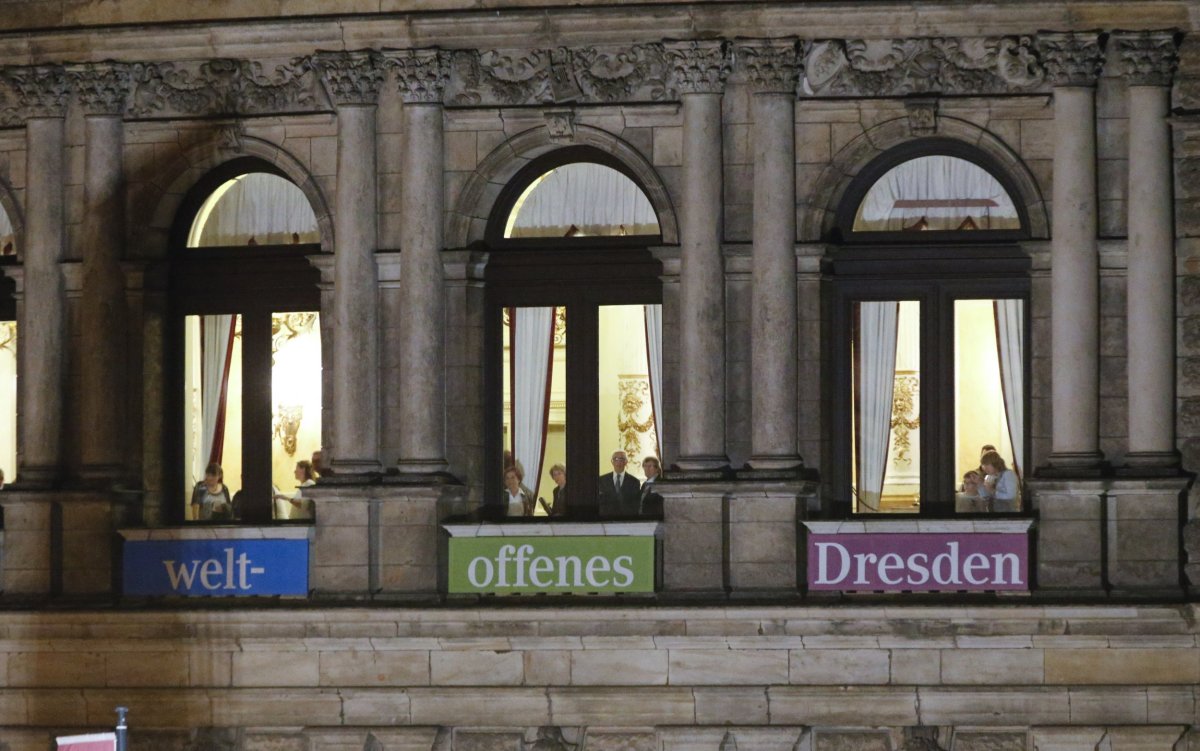
The square in front of the Semperoper, the opera house in Dresden, Germany, is busy one Sunday night in November. Music lovers wearing formal attire dash across the cobblestones toward ushers in red neckties, clutching tickets for Der Freischütz. Only two people appear to be standing still; they're staring at a giant television monitor fixed to the building's facade.
The monitor seems out of place on the Baroque building, a re-creation of a historic opera house that, like much of the city, was destroyed in World War II. But the director of the opera house felt it was important to project messages about tolerance and diversity in order to counter the weekly demonstrations outside its building by the nationalist group Pegida. The monitor broadcasts a slideshow of opera employees alongside their quotes about tolerance. Banners hanging from the building and nearby poles contain similar messages, such as, "For an Open World."
Twenty-four hours later, Pegida, or Patriotic Europeans Against the Islamization of the West, would occupy the same square, called the Theaterplatz, as it has done every Monday night since October 2014. As the refugee crisis in Europe has intensified and Germany has taken the bulk of asylum-seekers, nationalist and anti-Islam movements have grown. Pegida's founder, Lutz Bachmann, is from Dresden, and that is where the group has its headquarters. A representative of the group even ran for mayor there, though she later withdrew from the election.
A rally on the anniversary of Pegida's first demonstration reportedly drew 15,000 to 20,000 people. Local tour guides now warn visitors to avoid the area around the opera house those nights, and Dresdeners know to stay indoors.
"We find it really deplorable that the [square] of the Semperoper has to serve as the setting for the demonstrations," Wolfgang Rothe, the managing director and general manager, says by email. He adds that international staff and visitors are afraid and they've had to reschedule ballet rehearsals because of the demonstrations. "It is indeed not easy to deal with this situation and we try to stand up for our democratic and artistic values as much as we can."
Rothe says the opera house administration began discussing how to deal with Pegida immediately following the group's first demonstration, in October 2014. A month later, the Semperoper decided to hang banners. Around the time of the one-year anniversary of the demonstrations, it hung new banners and mounted the screen, which will be in place until December 22.
"Humanism, tolerance, humanity [and] plurality are inherent to our performing arts, our daily work," Rothe says. "These days we have to emphasize these ideas, to defend them against ignorance, aggression and incomprehension."
Jana Malschewski-Böhm, who gives tours of the opera house, is one of the employees whose image appears in the slideshow. On Monday nights, during the demonstrations, the monitor says only, "We don't want to be the setting of intolerance," with no images. "If [the demonstrators] know that one's supporting refugees, you're kind of on the blacklist," Malschewski-Böhm says.
Though the opera house is ground zero for the anti-Islam movement, people elsewhere in Dresden, a city of more than half a million people located two hours south of Berlin, are working extra hard to show Germany and the rest of the world that refugees are welcome there. A website for the network Dresden For All lists 95 groups, initiatives and organizations committed to helping refugees. Fifteen "welcome alliances" have sprung up, as have gardening clubs, cooking classes and jogging and soccer meet-ups. Arts organizations are running dance workshops for refugees and mental health professionals are donating their services.

"In the beginning I was very astonished that so many people wanted to help and wanted to do something. But you must know that these people are working silently. They are not [making] a lot of noise in the street," says Clemens Hirschwald, who was appointed by the city to help connect volunteers with refugee-related initiatives. He says some 2,000 people have contacted him about helping. "Every day something is going on; nearly every week I'm getting messages where some new project started, where some new people are helping."
"Pegida is a big part of the motivation" for helping, says Michael Kobel, who participates in a "welcome alliance" in the Löbtau district. "I couldn't stand it. I couldn't sit at home and do nothing."
Kobel says the alliances want to help refugees acclimate to German life and socialize with locals. "The basic problem is that many people who are protesting against the refugees don't know any refugees," he says. "I believe as soon as you get to know them, as soon as you try to integrate, do things together, cook together, do sports together, or just have a nice day together, if people know each other they will just see we are all humans and they are no different than we are."
The group also helps refugees learn German and find jobs and apprenticeships. "They have nothing to do," Kobel says. "They are always telling me, 'Well, we want to do more, just give us work, give us something to learn.'"
An arts center in Dresden, Hellerau, has gone so far as to host refugees in housing it typically provides for artists. Dieter Jaenicke, the artistic director, says a Syrian family has been living there since April and that the center plans to host another 12 to 15 refugees in the coming weeks. Others have taken to participating in counter-demonstrations near Pegida, using the slogan, "Heart Instead of Hate."
The weekly demonstrations have made the city unsafe for foreigners and racial minorities, locals say. "It has changed our life here," Jaenicke says. "Artists [who] are coming are scared.… We tell the artists who are here with us, 'Don't go out on Monday evenings, just stay at home, don't go anywhere because it's dangerous.'" He says he's seen people yell at and spit on people.
"You try to stay out of town Monday evenings," says Malschewski-Böhm, the opera house tour guide. She also runs city tours and has started telling visitors about the situation in order to warn them.
Kobel says, "It's police everywhere. The town is full of police, normal life is just stopped for the evening. There are no buses, no trams passing the center of the town."
Hirschwald, the city employee, says around 4,000 people are currently going through the asylum process in Dresden and another more than 5,000 are in the initial stages, waiting to start the asylum process. Newly released figures indicate that at least 950,000 asylum seekers registered this year in Germany, and Hirschwald says the country feels overwhelmed. He says it's as if "you make a party for 10 people and then hundreds of people are coming."
Despite Dresden's new reputation, a June survey by Dresden University of Technology found that only 12 percent of locals polled agreed with Pegida and 60.1 percent disagreed. More than three-quarters of locals polled rejected the idea of prohibiting Muslim immigrants, a concept that presidential candidate Donald Trump proposed in the United States last week.
"Wherever I go," says Hellerau's Jaenicke, "people are asking me what's happening in our city and it makes me very, very sad. Because actually it's such a beautiful city, but we have to do something about it. Unfortunately we cannot just pretend and say no, everything's fine. It's horrible what is happening here. It's horrible that the right-wing movement decided to make this city [its] headquarters."
Uncommon Knowledge
Newsweek is committed to challenging conventional wisdom and finding connections in the search for common ground.
Newsweek is committed to challenging conventional wisdom and finding connections in the search for common ground.
About the writer
Max Kutner is a senior writer at Newsweek, where he covers politics and general interest news. He specializes in stories ... Read more
To read how Newsweek uses AI as a newsroom tool, Click here.








